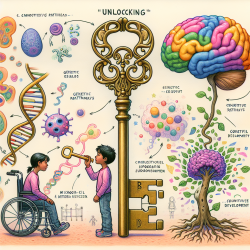Introduction
As practitioners dedicated to improving outcomes for children with autism, it is crucial to stay informed about the latest research findings. A recent study titled "A genetic study of autism in Costa Rica: multiple variables affecting IQ scores observed in a preliminary sample of autistic cases" provides valuable insights that can guide our practice and encourage further research. This study highlights the complex interplay of genetic and environmental factors in autism, particularly in the context of a population isolate in Costa Rica.
Understanding the Study
The study conducted in the Central Valley of Costa Rica (CVCR) aimed to explore the genetic underpinnings of autism in a Hispanic population. It utilized Spanish versions of the Autism Diagnostic Interview-Revised (ADI-R) and the Autism Diagnostic Observation Schedule (ADOS) to assess 76 cases of possible autism. The findings revealed that a significant proportion of these cases had IQ scores below 50, suggesting an ascertainment bias due to the lack of government-sponsored support programs and early intervention services in the region.
Key Findings and Implications
One of the critical outcomes of this research is the identification of a potential bias in the diagnosis of autism in the CVCR. The absence of early intervention programs means that only severe cases are typically brought to treatment, which may skew the understanding of autism's prevalence and characteristics in this population. Furthermore, the study suggests that the use of IQ tests without Costa Rican norms might underestimate the cognitive abilities of children with autism.
For practitioners, these findings underscore the importance of advocating for early intervention services and culturally appropriate assessment tools. By doing so, we can ensure that children with autism receive timely and accurate diagnoses, leading to better tailored interventions.
Actionable Steps for Practitioners
- Advocate for the development and implementation of early intervention programs in underserved areas.
- Encourage the use of culturally and linguistically appropriate diagnostic tools to improve the accuracy of autism assessments.
- Participate in training programs that enhance the ability to recognize and refer cases of high-functioning autism.
- Collaborate with researchers to contribute to the growing body of knowledge on autism in diverse populations.
Encouraging Further Research
This study highlights the need for further research into the genetic and environmental factors influencing autism in different populations. Practitioners can play a vital role by participating in research initiatives and sharing their clinical insights. By doing so, we can contribute to a more comprehensive understanding of autism and improve outcomes for children worldwide.
To read the original research paper, please follow this link: A genetic study of autism in Costa Rica: multiple variables affecting IQ scores observed in a preliminary sample of autistic cases.










